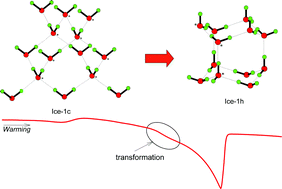Freeze–thaw behaviour of aqueous glucose solutions—the crystallisation of cubic ice
Abstract
We report on the polymorphic transitions of ice in aqueous solutions of

a School of Bionics, Tokyo University of Technology, 1404-1 Katakura, Hachioji, Tokyo, Japan
b Department of Biotechnology, School of Science and Engineering, Tokyo Denki University, Hatoyama, Hiki-gun, Saitama, Japan
c BioUpdate Foundation, 25 The Fountains, 229 Ballards Lane, London, UK
We report on the polymorphic transitions of ice in aqueous solutions of

 Please wait while we load your content...
Something went wrong. Try again?
Please wait while we load your content...
Something went wrong. Try again?
P. Thanatuksorn, K. Kajiwara, N. Murase and F. Franks, Phys. Chem. Chem. Phys., 2008, 10, 5452 DOI: 10.1039/B802042F
To request permission to reproduce material from this article, please go to the Copyright Clearance Center request page.
If you are an author contributing to an RSC publication, you do not need to request permission provided correct acknowledgement is given.
If you are the author of this article, you do not need to request permission to reproduce figures and diagrams provided correct acknowledgement is given. If you want to reproduce the whole article in a third-party publication (excluding your thesis/dissertation for which permission is not required) please go to the Copyright Clearance Center request page.
Read more about how to correctly acknowledge RSC content.
 Fetching data from CrossRef.
Fetching data from CrossRef.
This may take some time to load.
Loading related content
